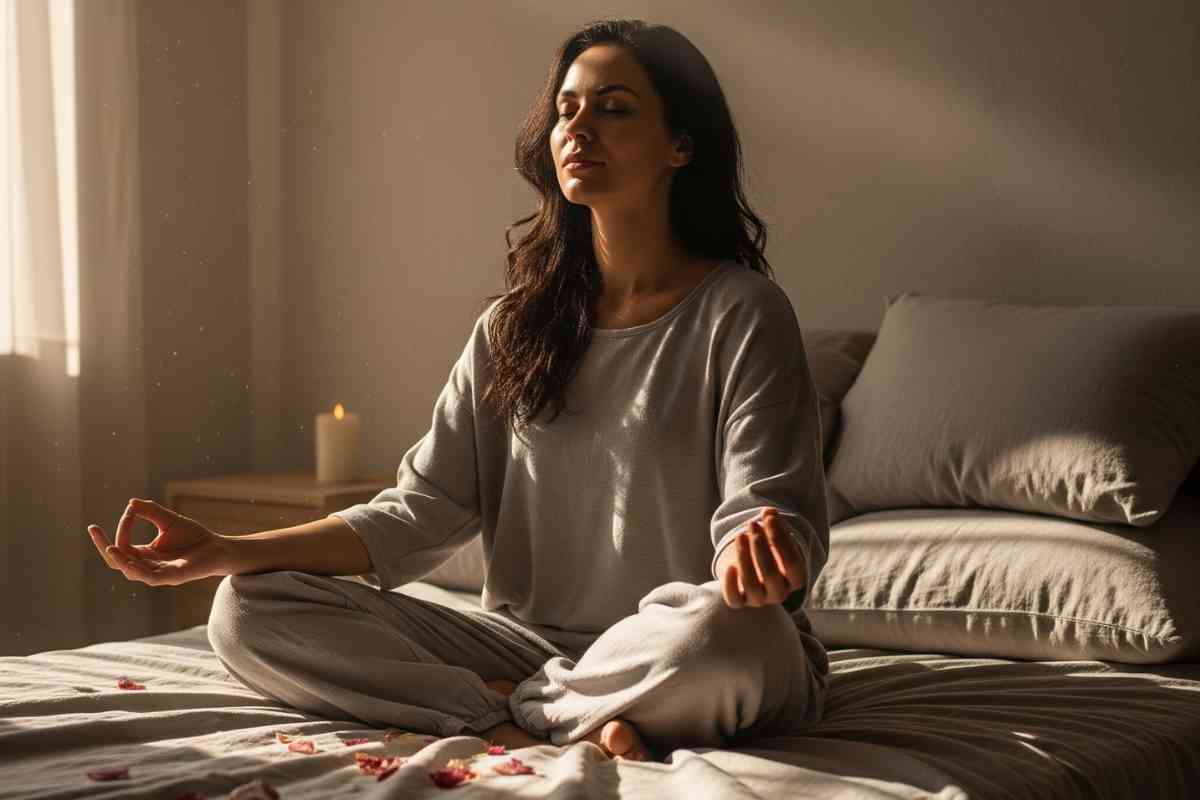How To Meditate In Bed For Anxiety?

That restless mind keeps racing the moment your head hits the pillow, stealing your peace and your sleep.
Left unchecked, it can spiral into exhausting nights and anxious days. But what if you could calm your thoughts without even leaving your bed? Discover how simple in-bed meditation can ease anxiety and invite deep rest.
Table of contents
Key Takeaways
Meditate in bed to calm your mind and reduce anxiety by focusing on breath and body awareness.
Lying down for meditation is comfortable and effective, especially if sitting isn’t an option.
Simple techniques like deep breathing, body scans, and visualization help relax your nervous system before sleep.
Using guided meditations or mindfulness apps can support your practice and ease nighttime anxiety.
Start with short sessions (10–15 minutes) and build a calming bedtime routine for better sleep and reduced anxiety.

What is Bed Meditation and How Does It Help with Anxiety?
Bed meditation, or sleep meditation, is a mindfulness technique practiced lying in bed.
It focuses on breath and body awareness to calm the mind, reduce anxiety, and promote relaxation, making it easier to fall asleep and enhancing overall sleep quality.

Can You Meditate While Lying Down in Bed?
Yes, you can meditate lying down in bed. Though the lotus position is traditional, lying down offers comfort and ease, especially for beginners, those in pain, or feeling tired. Meditation is flexible, choose the position that suits your needs best.
What Are the Benefits of Meditating in Bed for Anxiety Relief?
Promotes Deep Relaxation
When anxiety hits, your body feels tense and your thoughts won’t slow down. Deep relaxation helps by calming your mind and body at the same time.
Simple techniques like deep breathing, muscle relaxation, and guided imagery help you feel more at ease by slowing your heart rate and reducing stress.
According to Evidence-Based Complementary and Alternative Medicine (2021), just one session of these methods made people feel much more relaxed, both mentally and physically.
Reduces Racing Thoughts Before Sleep
Racing thoughts can keep your mind spinning at night and make anxiety feel even worse. Meditation helps by slowing those thoughts down and giving your brain a break.
It helps you focus on your breath instead of your worries, so you feel calmer and more ready to sleep.
According to Behavioural Brain Research (2019), people who meditated just 13 minutes a day for 8 weeks felt less anxious and handled stress better.
Improves Sleep Quality
When you sleep better, your mind feels calmer and less anxious the next day. That’s because good sleep gives your brain a chance to rest, reset, and handle stress more easily.
Meditating in bed helps you relax, fall asleep faster, and stay asleep longer. One study found that people who practiced mindfulness before bed had less trouble sleeping and felt more rested.
Another study showed that older adults who meditated for just six weeks slept better and felt less tired during the day, even without using sleep medicine.
Accessible and Comfortable
Meditating in bed makes anxiety relief easier for many people because it removes the pressure of finding the “perfect” spot to practice.
You don’t need a special room or equipment, your bed is right there, ready and familiar.
Comfort plays a big role here; when your body feels relaxed, your mind can settle more easily.
This helps anxious thoughts calm down. Bed meditation also works well for people with limited mobility, as it doesn’t require sitting upright or holding still on a hard floor.
Soft pillows, weighted blankets, or a cozy headrest can make the experience even better. Comfort boosts focus, too, making meditation more effective.
Establishes a Calming Routine
Meditating in bed builds a steady nighttime routine by signaling your mind and body to relax. Repeating this practice trains your brain to shift into a calmer state more easily.
This consistency helps lower anxiety and improves sleep by creating a reliable pattern. As you meditate regularly, your brain starts linking the practice with rest, making it easier to fall asleep.
A predictable routine like this reduces mental noise and supports emotional stability. Over time, the habit strengthens, helping you feel more in control at night.
This simple routine becomes a powerful tool for managing anxiety and improving overall mental health.
Encourages Mindfulness Without Effort
Meditating in bed makes mindfulness simple and natural. Lying down helps your body relax, which lowers mental resistance and eases anxiety.
The comfort of bed creates a calm space where awareness comes without effort. You don’t need perfect posture, just focus on being present.
Slow, deep breathing while in bed can quiet an anxious mind quickly. It works because you're not forcing anything.
The relaxed setting reduces the mental effort usually needed to meditate. In fact, mindfulness often works best when you’re not trying too hard.
Bed allows you to stay present without pressure, making meditation easier and more effective.
How Do I Start Meditating in Bed as a Beginner?
To start meditating in bed as a beginner, find a comfortable position, close your eyes, and focus on your breath.
Notice thoughts without judgment and gently return your attention to breathing. Using guided meditations can help maintain focus and support your practice.
What Breathing Techniques Can Calm Anxiety Before Sleep?
Breathing techniques like slow, deep breaths or the 4-7-8 method can be powerful tools to ease anxiety before bed.
According to Scientific Reports, deep breathing can reduce anxiety and depression while improving sleep quality, especially in patients recovering from heart surgery.
Dr. Friedman explains that the 4-7-8 technique helps calm the sympathetic nervous system, responsible for the “fight or flight” response, and activates the parasympathetic system, bringing a slower heart rate and deeper breathing.
These simple exercises promote relaxation and make it easier to drift off to sleep peacefully.
How Does a Body Scan Meditation Work in Bed?
Body scan meditation is a powerful bedtime practice that helps calm the mind by bringing awareness to different parts of the body.
According to JMIR Publications, this technique can improve sleep quality and reduce anxiety by breaking the link between stress and restless thoughts.
It works by activating the parasympathetic nervous system, the body's natural “rest and digest” mode, helping you relax deeply.
By focusing on physical sensations, body scans also reduce rumination and increase mindfulness.
Guided audios and mindfulness apps make the practice more accessible, especially for busy individuals.
According to the Journal of Technology in Behavioral Science, digital mindfulness tools can effectively support stress relief and relaxation, making body scan meditation a practical way to unwind and sleep better.
What is Visualization Meditation and How Can It Help with Sleep Anxiety?
Visualization meditation, also known as guided imagery, uses calming mental images to reduce stress and promote relaxation.
According to a study, this technique boosts alpha brainwave activity, enhancing focus and reducing anxiety.
According to the International Journal for Multidisciplinary Research, visualization significantly lowered cortisol levels, our primary stress hormone, before sleep in athletes.
This suggests its powerful role in stress management. Additionally, according to The New York Academy of Sciences, mindfulness-based visualization practices improved sleep quality and reduced anxiety compared to placebo-like controls.
Together, these findings highlight how visualization meditation can calm the mind, ease sleep-related stress, and improve emotional well-being.
For those struggling with sleep anxiety, this simple yet effective technique may offer much-needed relief.
Why Do Some People Feel More Anxious During Meditation?
While meditation is often seen as a path to peace, some people, especially beginners, report feeling more anxious during or after sessions.
Research shows that about 25% of regular meditators experience negative effects like panic, dissociation, or emotional numbness.
Heightened self-awareness can sometimes amplify distressing thoughts or sensations rather than easing them.
Mental health experts suggest that overdoing mindfulness may overstimulate brain regions linked to emotion and focus, leading to anxiety or even poor sleep.
It’s important to find the right type and amount of practice, and to remember that meditation isn’t one-size-fits-all.
Can Guided Meditations Help with Nighttime Anxiety?
Guided meditations can be a helpful tool for easing nighttime anxiety. According to the National Center for Complementary and Integrative Health, mindfulness and meditation practices, especially those focusing on breathing or calming imagery, can reduce stress and support better sleep.
Clinical studies show that mindfulness meditation significantly improves sleep quality over time.
According to JMIR Publications, users of apps like Headspace experienced a 23% decrease in perceived stress, with more frequent use linked to greater benefits.
Overall, guided meditation is a safe, effective way to calm the mind and reduce nighttime anxiety when practiced regularly.
How Long Should You Meditate in Bed to Ease Anxiety?
To ease anxiety through bedtime meditation, start with what feels manageable, around 10 to 15 minutes.
According to Headspace, if a session feels too long or uncomfortable, it's okay to scale back.
Meditation should feel challenging but not overwhelming. Studies show that even short, consistent sessions can calm the nervous system.
While some methods suggest up to 45 minutes, consistency matters more than duration. Find your personal “sweet spot” and stick with it. Meditating daily, even briefly, can lead to meaningful, long-term relief from anxiety.




